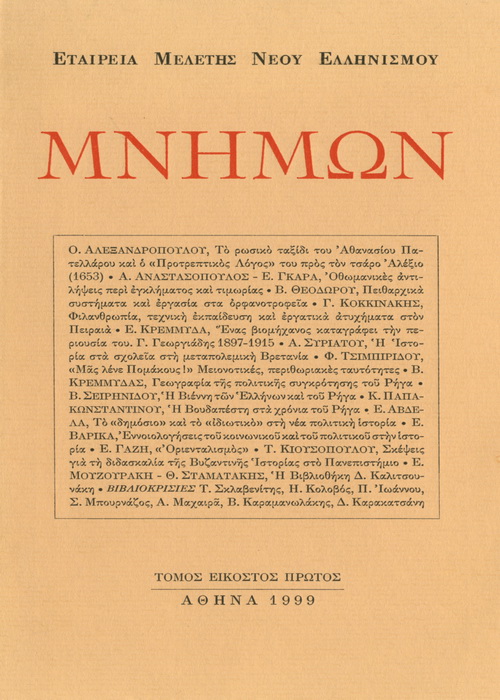ΚΑΘΗΚΟΝ ΚΑΙ ΕΝΣΤΙΚΤΟ: Η ΙΣΤΟΡΙΑ ΣΤΑ ΣΧΟΛΕΙΑ ΣΤΗ ΜΕΤΑΠΟΛΕΜΙΚΗ ΒΡΕΤΑΝΙΑ, 1945-1995
Περίληψη
Athena Syriatou, Duty and Instinct: History in Schools in Post-war Britain 1945-1995
This article deals with the moral role of history in post-war British education, by examining the relationship between the expectations of educationalists and intellectuals from history teaching at schools, and the actual changes which did occur in the classroom on the subject of history as a result of general changes in society and education. It argues that despite the intentions of the educationalists who saw history teaching as a means of promoting ideas which were considered necessary for the moral upbringing of the nation, these ideas very often never reached the classroom or they were considerably altered, demonstrating different ideological dynamics in British society. It initially focuses on the immediate post-war decade when international is educationalists were arguing for the need of history teaching which leads to a world citizenship. The idea of an internationalist approach on history contradicted the conservative, Britocentric, Whiggish history which was finally taught at schools during that period, since there were very few new books published, while civil servants from the Ministry of Education were concerned with the more urgent problems of schools which were affected by enemy action rather than new views on history teaching. The second period which is examined is the decade of mid sixties until mid seventies. Great changes were initiated then, to cover the disparity between the two tier system of education, with the introduction of comprehensive secondary schools, which at the time were considered to contribute to further démocratisation of the welfare state. The spirit of a more tolerant, affluent and democratic society led some educationalists to propose the expulsion of history from schools and its replacement with other humanities such as sociology and behavioural studies. However, history did remain at schools during that period and in many ways it incorporated the new ideas, creating the so called 'new history' with the efforts of the progressive, non traditionalist, and often leftist historians. Problems of implementation of the new history' appeared during the following years as a result of the difference of academic standards at schools which at this period comprehensive education could not eliminate. The final period which is examined is the decade of mid eighties until mid nineties when the New Right ideology was dominant in the political scene, while a National Curriculum for all schools was deemed necessary. Educational planners of the Conservative Party argued that history should teach again traditional values, which were, according to them, intrinsic to the British nation. However, the National Curriculum for History which was drafted by educationalists coming various convictions,(nevertheless appointed by the Conservative government), was closer to the beliefs of the new history' creators, rather than the beliefs and national values that the Conservatives initially wanted to promote.
Λεπτομέρειες άρθρου
- Πώς να δημιουργήσετε Αναφορές
-
ΣΥΡΙΑΤΟΥ Α. (1999). ΚΑΘΗΚΟΝ ΚΑΙ ΕΝΣΤΙΚΤΟ: Η ΙΣΤΟΡΙΑ ΣΤΑ ΣΧΟΛΕΙΑ ΣΤΗ ΜΕΤΑΠΟΛΕΜΙΚΗ ΒΡΕΤΑΝΙΑ, 1945-1995. Μνήμων, 21, 133–162. https://doi.org/10.12681/mnimon.732
- Τεύχος
- Τόμ. 21 (1999)
- Ενότητα
- ΜΕΛΕΤΕΣ
Οι συγγραφείς των άρθρων που δημοσιεύονται στο Μνήμονα διατηρούν τα δικαιώματα πνευματικής ιδιοκτησίας επί των άρθρων τους, δίνοντας στο περιοδικό το δικαίωμα της πρώτης δημοσίευσης. Άρθρα που δημοσιεύονται στο Μνήμονα μπορούν να χρησιμοποιούνται ελεύθερα, χωρίς δικαίωμα τροποποίησης (δημιουργία παράγωγου έργου) με αναφορά στο συγγραφέα και στην πρώτη δημοσίευση για μη κερδοσκοπικούς σκοπούς(άδεια Creative Commons 4.0). To Εθνικό Ίδρυμα Ερευνών διατηρεί το δικαίωμα να δημοσιεύει, να αναπαραγάγει, να παρουσιάζει στο κοινό, να διανέμει και χρησιμοποιεί άρθρα που δημοσιεύονται στο Μνήμονα σε οποιοδήποτε μέσο και μορφή είτε μεμονωμένα είτε ως μέρη συλλογικών έργων, για όλο το χρόνο διάρκειας προστασίας της πνευματικής ιδιοκτησίας και για όλες τις χώρες του κόσμου. Αυτό περιλαμβάνει ενδεικτικά και όχι αποκλειστικά, το δικαίωμα δημοσίευσης των άρθρων σε τεύχη του περιοδικού Μνήμων, αναπαραγωγής και διανομής μεμονωμένων αντιγράφων των άρθρων, αναπαραγωγής ολόκληρων των άρθρων σε άλλη έκδοση του ΕΙΕ, και αναπαραγωγής και διανομής των άρθρων ή περίληψης αυτών με χρήση πληροφορικού συστήματος αποθετηρίου.



